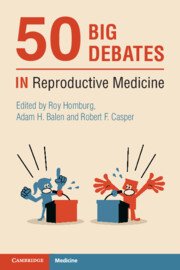Book contents
- 50 Big Debates in Reproductive Medicine
- Series page
- 50 Big Debates in Reproductive Medicine
- Copyright page
- Contents
- Contributors
- Foreword
- Introduction
- Section I Limits for IVF
- Section II IVF Add-ons
- Section III The Best Policy
- Section IV Embryology
- Section V Ethics and Statistics
- Section VI Male-factor Infertility
- 35A Sperm Counts Are Falling Worldwide
- 35B Sperm Counts Are Falling Worldwide
- 36A There Is Value in Examining Sperm DNA Fragmentation
- 36B There Is Value in Examining Sperm DNA Fragmentation
- 37A Testicular Sperm Should Be Considered for Repeated ICSI Failed Implantation Cases in Men with High Sperm DNA Damage
- 37B Testicular Sperm Should Be Considered for Repeated ICSI Failed Implantation Cases in Men with High DNA Damage
- Section VII Genetics
- Section VIII Ovarian Stimulation
- Section IX Hormones and the Environment
- Index
- References
35A - Sperm Counts Are Falling Worldwide
For
from Section VI - Male-factor Infertility
Published online by Cambridge University Press: 25 November 2021
- 50 Big Debates in Reproductive Medicine
- Series page
- 50 Big Debates in Reproductive Medicine
- Copyright page
- Contents
- Contributors
- Foreword
- Introduction
- Section I Limits for IVF
- Section II IVF Add-ons
- Section III The Best Policy
- Section IV Embryology
- Section V Ethics and Statistics
- Section VI Male-factor Infertility
- 35A Sperm Counts Are Falling Worldwide
- 35B Sperm Counts Are Falling Worldwide
- 36A There Is Value in Examining Sperm DNA Fragmentation
- 36B There Is Value in Examining Sperm DNA Fragmentation
- 37A Testicular Sperm Should Be Considered for Repeated ICSI Failed Implantation Cases in Men with High Sperm DNA Damage
- 37B Testicular Sperm Should Be Considered for Repeated ICSI Failed Implantation Cases in Men with High DNA Damage
- Section VII Genetics
- Section VIII Ovarian Stimulation
- Section IX Hormones and the Environment
- Index
- References
Summary
The deterioration of semen quality was first reported in 1974 by Nelson and Bunge. The topic has sparked plenty of controversy around the globe since Carlson et al. published their review in 1992 about the decreasing quality of semen in the past 50 years. It divided the scientific community for and against the topic for a long time without any firm conclusion. Looking at the evidence published so far I am convinced that there has been a temporal and spatial decline in the sperm counts worldwide.
- Type
- Chapter
- Information
- 50 Big Debates in Reproductive Medicine , pp. 179 - 180Publisher: Cambridge University PressPrint publication year: 2021



